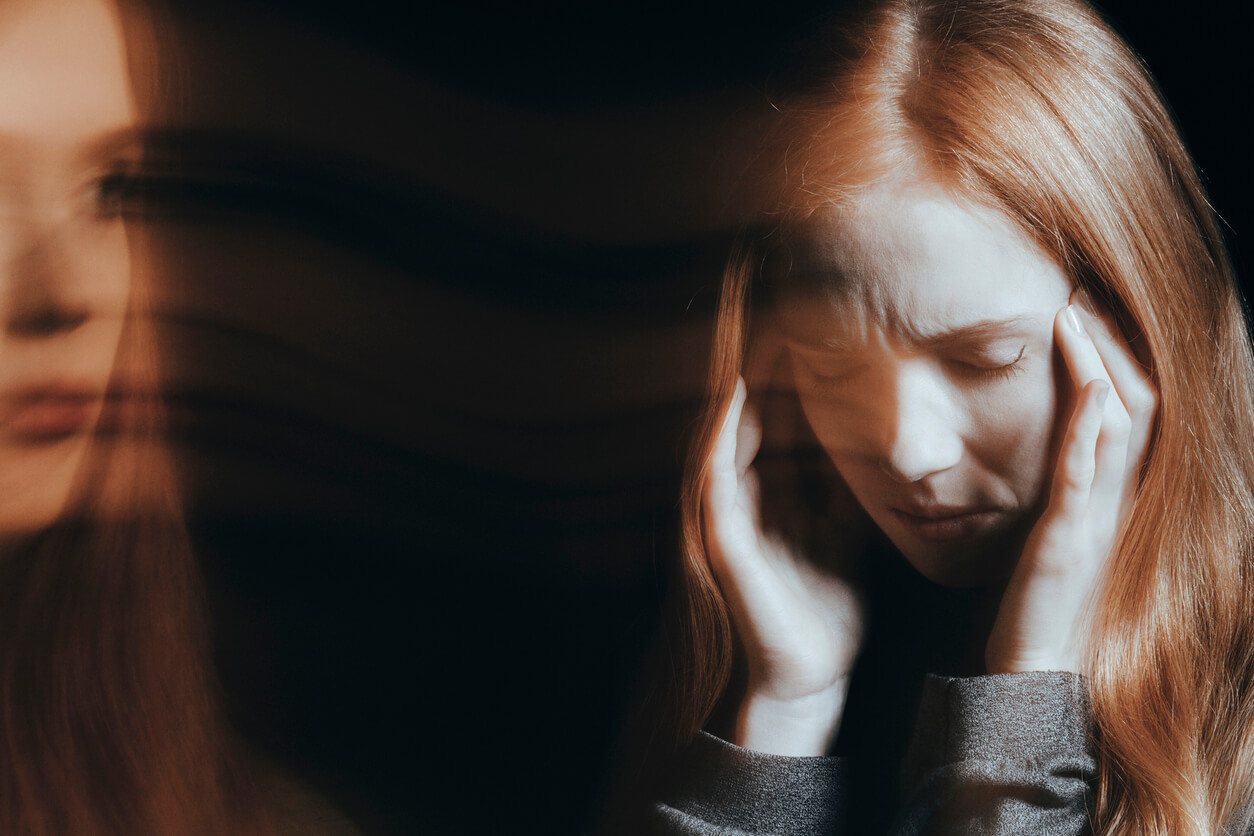6 Signs of Psychosis in Adolescents


Written and verified by the psychologist Elena Sanz Martín
Psychosis is one of the most serious mental conditions that exist. It’s not really a disease in itself, but a manifestation that can appear in a multitude of illnesses. However, many of them usually begin before reaching adulthood. Therefore, it’s essential to be alert to the early signs of psychosis in adolescents.
Once developed, psychosis can be extremely frightening and challenging for both the young person and the family. In addition to the discomfort and emotional distress, virtually all areas of life, such as school, family, and friendships, will be limited. Fortunately, if detected in the early stages, it’s possible to intervene to prevent it or attenuate the symptoms.
What is psychosis?
Psychosis is a serious mental condition in which the person loses contact with reality. It’s characterized mainly by hallucinations (the person may hear or see things that don’t exist) and delusions (unreal ideas or thoughts). Also, emotions, motivation, language, and behavior may be affected.
Psychosis is a set of symptoms that appears in the course of different mental disorders. Mainly in the following:
- Schizophrenia
- Depression
- Bipolar disorder
- Brief psychotic crises
- Psychosis induced by the consumption of substances
All of these conditions can emerge as early as adolescence, but schizophrenia especially tends to appear during this period. In addition, this is a particularly vulnerable stage in which many young people start using drugs, which can trigger the disorder.

Signs of psychosis in adolescents
Before psychosis itself appears or the associated illness fully develops, it’s possible to identify certain signs. These are known as prodromal symptoms and are essentially attenuated or mild symptoms of psychosis.
Not all adolescents with these signs will develop psychosis, but they’re at a much higher risk of doing so. Here are some of these signs to watch for.
1. Behavioral changes
Any change in a teenager’s usual behavior should be watched for, as it may be a warning sign. Here are some examples:
- A tendency to isolate and to spend long periods locked in their room
- Lack of interest in socializing with family or friends
- Lack of interest in activities they used to enjoy
- Refusing to go to school
- Changing friendships or hobbies
2. Sleep disturbances
Changes in sleeping and eating patterns are important symptoms. The young person may eat much less or much more than usual, have sleepless nights or alter their sleep schedules altogether.
3. Communication and language
One of the signs of psychosis in adolescents is manifested on the communicative level. The young person may have difficulty expressing themself and give rise to incoherent, disjointed, or inconclusive speech. Therefore, they may find it difficult to put their ideas into words, use strange expressions, or speak in a rushed manner.
4. Strange perceptions and thoughts
These are the most striking signs. On the one hand, the young person may hear voices, beeps, or sounds that aren’t really there, as well as see figures or shadows. In general, any anomalous perception should set off alarm bells. Likewise, strange thoughts may appear, such as ideas of grandiosity (believing oneself to be superior, chosen, or possessing a superpower).

5. Mistrust
A pattern of distrust of others may appear that’s accompanied by the belief that others mean to cause them harm. As a result, the young person may be suspicious and hypervigilant without having reason to be.
6. Self-neglect
Finally, we should be alerted if the young person begins to clearly neglect their image, appearance, and personal hygiene. For example, they don’t shower, don’t change their clothes, or have unkempt hair.
Acting upon the first signs of psychosis in adolescents
The truth is that these signs aren’t exclusive to psychosis, but some may be indicative of other disorders such as anxiety or depression. They may even occur at certain times during adolescence without any underlying problem. Even so, it’s highly recommended to consult a professional to clarify what’s going on.
If prodromal symptoms are detected early, it’s possible to intervene by making some changes in lifestyle, thoughts, and coping strategies. However, if not addressed early on, the disease may eventually flare up and symptoms will be more severe than if early attention is received. Therefore, at the first signs, don’t hesitate to see your doctor or a specialist in youth psychology.
Psychosis is one of the most serious mental conditions that exist. It’s not really a disease in itself, but a manifestation that can appear in a multitude of illnesses. However, many of them usually begin before reaching adulthood. Therefore, it’s essential to be alert to the early signs of psychosis in adolescents.
Once developed, psychosis can be extremely frightening and challenging for both the young person and the family. In addition to the discomfort and emotional distress, virtually all areas of life, such as school, family, and friendships, will be limited. Fortunately, if detected in the early stages, it’s possible to intervene to prevent it or attenuate the symptoms.
What is psychosis?
Psychosis is a serious mental condition in which the person loses contact with reality. It’s characterized mainly by hallucinations (the person may hear or see things that don’t exist) and delusions (unreal ideas or thoughts). Also, emotions, motivation, language, and behavior may be affected.
Psychosis is a set of symptoms that appears in the course of different mental disorders. Mainly in the following:
- Schizophrenia
- Depression
- Bipolar disorder
- Brief psychotic crises
- Psychosis induced by the consumption of substances
All of these conditions can emerge as early as adolescence, but schizophrenia especially tends to appear during this period. In addition, this is a particularly vulnerable stage in which many young people start using drugs, which can trigger the disorder.

Signs of psychosis in adolescents
Before psychosis itself appears or the associated illness fully develops, it’s possible to identify certain signs. These are known as prodromal symptoms and are essentially attenuated or mild symptoms of psychosis.
Not all adolescents with these signs will develop psychosis, but they’re at a much higher risk of doing so. Here are some of these signs to watch for.
1. Behavioral changes
Any change in a teenager’s usual behavior should be watched for, as it may be a warning sign. Here are some examples:
- A tendency to isolate and to spend long periods locked in their room
- Lack of interest in socializing with family or friends
- Lack of interest in activities they used to enjoy
- Refusing to go to school
- Changing friendships or hobbies
2. Sleep disturbances
Changes in sleeping and eating patterns are important symptoms. The young person may eat much less or much more than usual, have sleepless nights or alter their sleep schedules altogether.
3. Communication and language
One of the signs of psychosis in adolescents is manifested on the communicative level. The young person may have difficulty expressing themself and give rise to incoherent, disjointed, or inconclusive speech. Therefore, they may find it difficult to put their ideas into words, use strange expressions, or speak in a rushed manner.
4. Strange perceptions and thoughts
These are the most striking signs. On the one hand, the young person may hear voices, beeps, or sounds that aren’t really there, as well as see figures or shadows. In general, any anomalous perception should set off alarm bells. Likewise, strange thoughts may appear, such as ideas of grandiosity (believing oneself to be superior, chosen, or possessing a superpower).

5. Mistrust
A pattern of distrust of others may appear that’s accompanied by the belief that others mean to cause them harm. As a result, the young person may be suspicious and hypervigilant without having reason to be.
6. Self-neglect
Finally, we should be alerted if the young person begins to clearly neglect their image, appearance, and personal hygiene. For example, they don’t shower, don’t change their clothes, or have unkempt hair.
Acting upon the first signs of psychosis in adolescents
The truth is that these signs aren’t exclusive to psychosis, but some may be indicative of other disorders such as anxiety or depression. They may even occur at certain times during adolescence without any underlying problem. Even so, it’s highly recommended to consult a professional to clarify what’s going on.
If prodromal symptoms are detected early, it’s possible to intervene by making some changes in lifestyle, thoughts, and coping strategies. However, if not addressed early on, the disease may eventually flare up and symptoms will be more severe than if early attention is received. Therefore, at the first signs, don’t hesitate to see your doctor or a specialist in youth psychology.
All cited sources were thoroughly reviewed by our team to ensure their quality, reliability, currency, and validity. The bibliography of this article was considered reliable and of academic or scientific accuracy.
- Insúa, P., Grijalvo, J., & Huici, P. (2001). Alteraciones del lenguaje en la esquizofrenia: Síntomas clínicos y medidas psicolingüísticas. Revista de la Asociación Española de Neuropsiquiatría, (78), 27-50.
- Miret, S., Fatjó-Vilas, M., Peralta, V., & Fañanás, L. (2016). Síntomas básicos en la esquizofrenia, su estudio clínico y relevancia en investigación. Revista de Psiquiatría y Salud Mental, 9(2), 111-122.
This text is provided for informational purposes only and does not replace consultation with a professional. If in doubt, consult your specialist.








